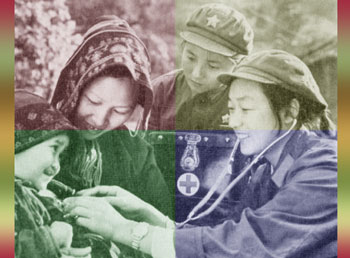
I kept a diary. “For the last month,” I wrote, “we spent hours in meetings and tours. Every tour was preceded or finished by meetings around a long table, with cups of tea, speeches of welcome, and lectures on the local unit. Everywhere crowds of friendly and curious Chinese people surrounded us. The papers had announced our presence, and people were eager to see us. Shopping was difficult while on public parade, but everyone was helpful and gracious. Every city wanted to host a banquet — a sumptuous feast with Chinese delicacies and liquor. Everyone had to make toasts with maotai (Chinese grain alcohol) and Gan bei (‘Bottoms up’).”
We spent several nights in a small village in central China, dining and staying with local villagers. I remember watching our female hosts make sweet-potato noodles and hang them to dry on their courtyard clothesline. I also visited with the village paramedics. Seated in a circle in that same dry dirt courtyard, I interviewed the local midwife, pharmacist, and “barefoot doctor” about their training and motivation, their daily routine. The “barefoot doctor” is the Chinese version of a physician assistant. The trainee receives mostly hands-on training, with only a six-month medical course in a nearby commune hospital. “Serve the people. Follow the teachings of Chairman Mao,” was the refrain everywhere. “Come with us,” they urged, and showed us the small supply of traditional herbal and pharmaceutical medications, stocked in their one-room pharmacy. “Here is where I see patients,” said the barefoot doctor, pointing to the courtyard and a small adjoining room.
Their enthusiasm and the services they provided impressed me. This work doesn’t require much training, I thought. It’s practical and helps people directly. I could do this. Dressed in simple blue Mao uniforms, they were also unpretentious. These unassuming and dedicated people provided so many needed services. I’d like to be a person like this, I concluded.
When we had sinus infections in the city, our hosts took us to the local pharmacists who loaded us with Chinese antibiotics and sinus remedies. At another city, we toured a hospital and viewed an appendectomy from an amphitheater, watching the anesthesiologist use her acupuncture needles for the anesthesia. “When I began, I was a barefoot doctor in a village,” she said. “Since I showed promise, the Party sent me back to school for more training. Now I am an anesthesiologist.” As the only CCAS student focusing on health care, I took copious notes. When I return to the U.S., I thought, I’d like to become a barefoot doctor.
The final night in Peking was a special treat. In the afternoon, we were told, “Be prepared for a late night meeting tonight. Don’t leave your hotels.” We did our laundry, ate with our guides at the hotel restaurant, and waited. Then at about 10 our guides excitedly announced, “Zhou Enlai will meet with you tonight.” We waited and waited. Finally, about midnight, the bus arrived. Staff escorted us into the vehicle, and drove through Tiananmen Square to the Great Hall of the People. Officials waved us into a large, high-ceilinged meeting room. Traditional Chinese paintings of birds and flowers hung on the walls. Zhou, his fine-chiseled face rising above his pressed Mao uniform, stood to greet us. Wicker chairs and small tables, where we could sit and place our notebooks and tape recorders, stood in a semicircle around the room. Again, there was tea, and more speeches. Zhou had been well briefed. He knew what state and what university each of us was from. After speaking for two hours, he answered our questions and asked some too. “What impressed you most? Did you get a chance to talk with people? I know you wanted to spend the night with ordinary people. How did you find that?”
We talked about our trip, discussed American foreign policy, and asked questions. He was charming, gracious, and knowledgeable. He always asked us to portray a complete and honest picture of what we had experienced. “That is the way to give true understanding,” he argued. Photographers took pictures of Zhou Enlai and our group, which they presented to us the next day.
When I returned to Ann Arbor, I began a flurry of writing and speeches around Ann Arbor and the East Coast. People listened to us eagerly. I was excited. After a few months, however, focus on understanding China was no longer so novel, although it was still important. The door to new relations had opened, and a door to my new career was ajar. I wanted to study medicine. How could I be a barefoot doctor in the U.S.? I wanted to set a new course — one which was interesting and important, of service to others and practical, and with one-on-one contact.
Chen Guancheng grew up in China to become a human rights activist, and to open eyes to the injustices of the Chinese bureaucracy and legal system; after that trip, I studied to become a physician and advocate, working with vulnerable and underserved minorities in the U.S., including Chinese immigrants.

